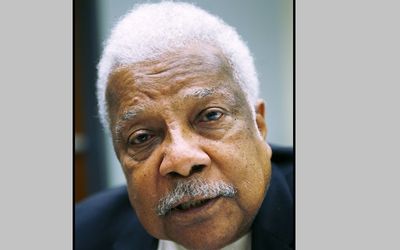PBS: Escaping Eritrea … [Read More...] about ካብ ውሽጢ ቤት ማእሰርታት ኤርትራ
Rich tribute to one of Africa’s intellectual giants
Adekeeye Adebajo | 25 July 2016 | Business Day

A RECENT symposium in Nairobi honoured the legacy of one of Africa’s most renowned intellectuals, Kenya’s Ali Mazrui, who died in October 2014. He published more than 40 books, and scores of journal and newspaper articles, and contributed more to shaping perceptions about contemporary Africa than any other scholar.
Incredibly, this was the first such symposium to be convened in Mazrui’s home country on his intellectual contributions. The meeting was billed as an intergenerational dialogue and saw some impressive contributions on the “Global African’s” intellectual canon from prominent scholars and several of Mazrui’s younger protégés.
The conference started with an address by the recently retired chief justice of the Kenyan Supreme Court, Willy Mutunga, who has written about and edited works on Mazrui’s intellectual contributions. He described him as a “courageous debater”, “original thinker”, and “poetic writer”.
Jamaican scholar Horace Campbell outlined Mazrui’s contributions to the pan-African reparations movement including his membership of the then Organisation of African Unity’s Group of Eminent Persons on Reparations for Black Enslavement. Campbell also highlighted the Kenyan’s promotion of African languages in transforming education on the continent.
A previous critic of Mazrui’s liberalism, Campbell noted Mazrui’s transformation from an “Afro-Saxon” to a prophet of global pan-African struggles.
In a similar vein, Ugandan scholar Mahmood Mamdani described the Kenyan’s metamorphosis from an aspiring universal scholar to a public intellectual. This was a result of Mazrui’s disenchantment at many prejudiced liberal intellectuals who regarded him as merely a black Muslim scholar in the US, where he taught for four decades.
Kenyan academic Makau Mutua similarly assessed Mazrui’s transformation from a “prince” to a global intellectual, noting how he simultaneously embraced liberalism and liberation, and insisted on the equal recognition to world scholarship of the intellectual contributions of the cultures of the “global south”.
Kenyan literature professor Chris Wanjala assessed Mazrui’s 1971 novel, The Trial of Christopher Okigbo, in which the author “tried” Nigeria’s greatest poet for the “crimes” of putting Igbo nationalism before Nigerian unity and betraying his art by swapping the pen for the pistol. The novel was set in an African “Hereafter” against the background of the bloody disunity of the Nigerian civil war of 1967 to 1970. Wanjala examined Mazrui’s understanding of the roles and responsibilities of African intellectuals through this elegant work of fiction, the author’s only novel.
Veteran Kenyan scholar-politician and current senator Peter Anyang’ Nyong’o had been taught by Mazrui — who became a full professor at 32 — at Uganda’s Makerere University in the late 1960s.
Nyong’o revisited the critique of his former teacher’s “Whig” interpretation of African politics, which was said to have simplified history by interpreting the present through past events without rigorously connecting both. Nyong’o noted that Mazrui outgrew his Whig roots to embrace liberalism and African nationalism.
Kenyan scholar Samuel Makinda analysed Mazrui’s “eclecticism” as the pillar of his intellectual contributions, revisiting his famous concept of the “triple heritage” — of African tradition, Islamic culture and Western ideas — that was conceptualised into Mazrui’s famous 1986 nine-part documentary “The Africans”.
African-American intellectual Darryl Thomas focused on Mazrui’s critique of Pax Americana trying to homogenise global culture through its hegemony. Canadian scholar Tim Shaw interrogated Mazrui’s “transnationalism”, based on his life in Uganda, Britain and the US, as well as his interest in multiple identities. Kenyan historian Macharia Munene assessed Mazrui as a “verbal combatant” and recalled some of his most memorable intellectual battles with scholars such as Nigeria’s Wole Soyinka and Guyana’s Walter Rodney.
Other interesting presentations were made by Mazrui’s South African bibliographer, Abdul Bernath, and his Ethiopian protégé, Seifudein Adem. Malawi’s Paul Zeleza delivered a magisterial conference summary, noting that Mazrui had contested nationalistic and Eurocentric scholarship, while embracing a globalisation of Africa that insisted the continent was central, and not peripheral, to world politics.
In my presentation at the seminar, I examined Mazrui’s idea of Pax Africana, which called for Africans to create and consolidate peace on their own continent. My question: “Who killed Pax Africana?” echoed Mazrui’s famous 2002 article “Who killed democracy in Africa?”.
I identified five “villains” for the demise of Pax Africana: poor governance; failure of human rights; corruption; violent extremism; and pernicious external actors.
This was a rich and stimulating conference, and a fitting tribute to the intellectual corpus of the most important African intellectual of the past 50 years.
• Dr Adebajo is executive director of the Centre for Conflict Resolution in Cape Town and visiting professor at the University of Johannesburg
